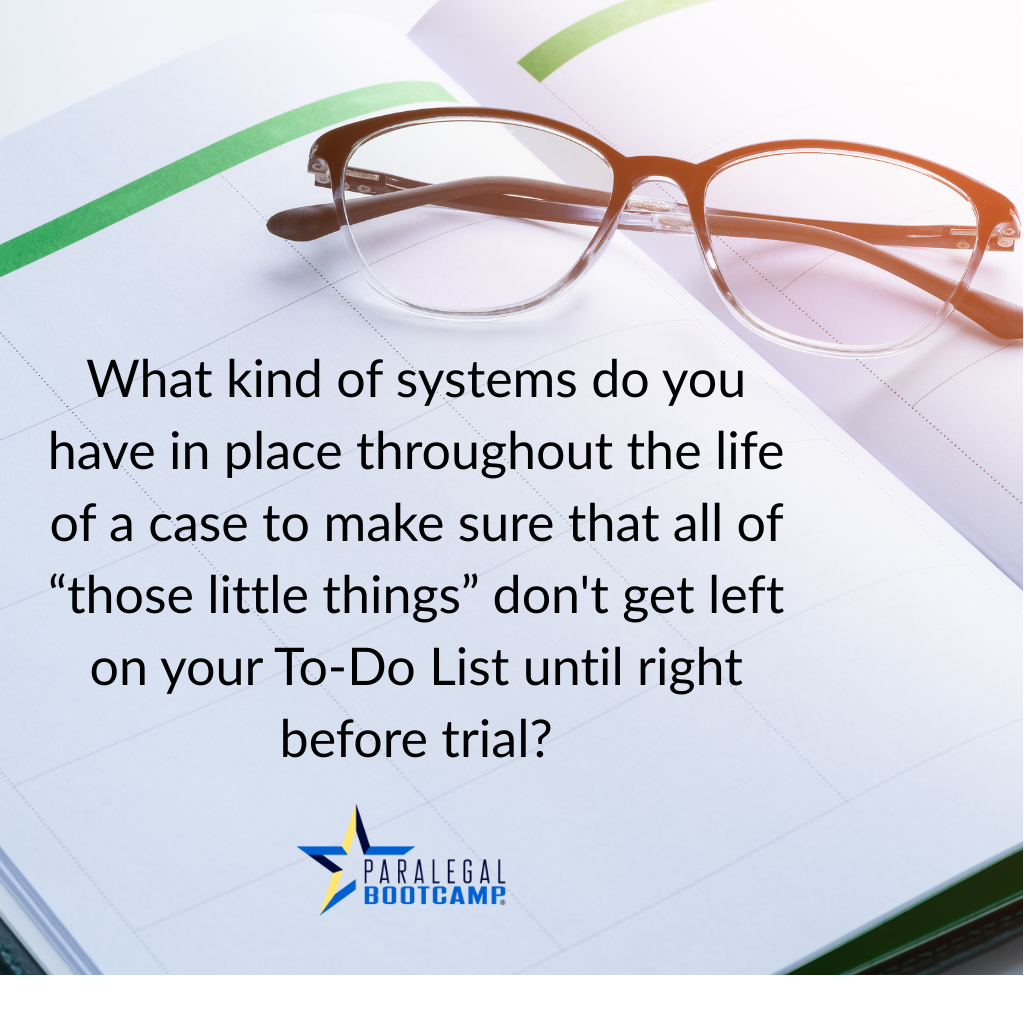You just found out you’re going to trial. Cue the panic button. 😬
Maybe you’ve been a litigation paralegal for a while, but it’s your first time supporting a litigation team at trial, or maybe you’re new to the paralegal profession.
Either way, your brain is racing:
What if I forget something? How will I even know if I forget something if I don’t even know what I’m supposed to have at trial?
What if I forget to put an exhibit on the list? What if I can’t find an exhibit when the attorney asks me for it?
You’ve got this.
I’m going to walk you through the 5 most important things you need to know before your first trial – or as a refresher if it’s a been a while since your last trial.
Prefer to listen instead of read?
5 Things Every Litigation Paralegal Should Know Before Trial
1 – Trial prep starts sooner than you think
If you’re waiting until you receive the “notice of trial” or the pretrial conference to start prepping your trial binders, you’re already behind.
Hopefully, that’s not your situation. If it is, I wrote an article that will help you prepare a Trial Notebook and explain each section’s contents.
Trial prep starts the moment the complaint is filed.
Start thinking ahead:
👉 Are the discovery responses completed? If not, is there a system in place to follow up?
👉 Did we receive the original deposition transcripts after the depositions? If not, is there a system in place to get them well before they will be needed for trial?

When you have systems in place to get all of the “little stuff” out of the way while you have the time and you’re not under the pressure of trial deadlines, you’ll save yourself a ton of stress in the final weeks.
🎯 Pro Tip: Maintain a “trial-ready” mindset and a “trial-ready” file. Organize everything (pleadings, discovery, exhibits) as if you’re going to be sitting in court tomorrow and your attorney is going to ask you to find a copy of it.
One caveat going forward in this article, is that there can be subtle differences between working for a plaintiff vs. a defense firm in terms of how much effort and expense you spend in this phase of a case.
2 – You’re the Gatekeeper of the Exhibit List
The exhibit list isn’t just a formality that gets filed with the court for trial. It is your foundation.
One of the primary responsibilities of a trial paralegal is to track what evidence gets admitted at trial. This was an important lesson that I learned at my first trial when I thought I was there to take notes and find exhibits for the attorney.
🎬 Here’s a video blog on that big lesson I learned at my first trial as a litigation paralegal.
Some common mistakes I’ve seen:
❌ Adding documents at the last minute without updating the exhibit list
❌ Having inconsistent file names between the digital file and the printed copies
❌ Not noting which exhibits were admitted vs. objected to and never made it into evidence
When you’re the trial paralegal and the attorney turns to you and asks for a copy of exhibit 47, you want to be able to hand them a copy in seconds, because in that moment, seconds will feel like minutes.
🎯 Pro Tip: Prepare a comprehensive “master” exhibit list that is for your eyes only, that contains more identifying information than the copy that the court and the opposing counsel’s version has in it. This will allow you to do keyword searches and filters (if you do it in an Excel file) to quickly find exhibits. This is what I teach inside the Trial Prep Boot Camp.
Trial Prep Boot Camp
Getting ready for trial is stressful and rewarding at the same time.
What if your next trial didn’t involve 14-hour work days?
We’ll show you to be so prepared for your next trial that you will actually enjoy going to trial…even if you work for the Master of Procrastination!

3 – Logistics can make or break a trial
Exhibits and witnesses are a big part of your job as a trial paralegal, but logistics are just as important.
I’ve seen trials fall apart because:
- The war room didn’t have internet access that was powerful enough to accommodate a team of 8 people working at the same time on the same wifi.
- The projector cable used in the hotel trial war room didn’t fit the courtroom’s AV setup.
- The hotel wasn’t close enough to the courthouse, and the trial team spent an hour every morning stuck in traffic, and one morning was late to court.
Even if it was the secretary back at the office who booked the hotel or the out-of-town war room, guess who they’re turning to when something goes wrong with the trial logistics? You guessed that right. 🫵 You’re the one who has to fix it.
🎯 Pro Tip: Create a Trial Logistics Checklist that you review after every trial to see if there are any other things to add to it. For example, the story I told in the podcast episode above was about the pool construction that took place during the trial I was at.

Free Strategy Guidebook for
New Litigation Paralegals
Are you ready to fast-track your litigation paralegal career?!
Our free guidebook reveals three powerful strategies that will set you up for success in your journey. If you’re ready to seize this opportunity and thrive as a litigation paralegal, sign up below, and get started now!
4 – Be the calm in the chaos
Trial can be intense. Emotions run high. Attorneys get cranky. You get cranky.
As a trial paralegal, you can be a huge asset if you can be the one to stay calm, be resourceful, and be supportive – no matter what gets thrown at you.
A trial paralegal wears many hats.
Document wrangler.
Operations lead.
Problem solver.
Errand runner.
Therapist.
With all of those roles, how can you also be the calm in the chaos?
✅ Don’t take things personally. If someone snaps, give them grace and move on. If it’s something serious, it can be addressed after the trial.
✅ Think and plan ahead. If you see an issue brewing, flag it early.
✅ Be the person the team can depend on when everything feels like it’s falling apart. Don’t be the person who reminds them how badly it’s falling apart.
✅ Practice the calming method from our podcast friend, Vincent Ascolese: STOP.
Stop.
Take a deep breath.
Observe the experience.
Proceed with something supportive.
Watch his full video interview below. ⬇️
5 – Know the case inside and out
You can’t be a really good trial paralegal by skimming the surface of the case.
You are not just “supporting” the attorney – you are part of the litigation team.
By the time you walk into court, you should:
1️⃣ Know the case inside and out
2️⃣ Be able to spot inconsistencies in testimony
3️⃣ Know the key exhibits and how they play a role in the case
When you do this, attorneys start to treat you as a key member of the team, not just an assistant.
🎯 Pro Tip: During discovery, start to keep a personal case summary or “hot sheet” of key facts, witnesses, and exhibits. Update it throughout the case and use it to jog your memory.
Conclusion
Trials can be stressful and tough, but they can also be one of the most exciting and rewarding parts of being a litigation paralegal.
This is your chance to shine – not just behind the scenes, but front and center as a key member of the trial team.
The more trials you get under your belt, the more confidence you have at your next trial, and the more confidence you have as a litigation paralegal.
You’ve got this!
More Paralegal Resources For You
🔎 Is It Worth It To Become a Litigation Paralegal?
🔎 What is a Litigation Paralegal?
🔎 10 Lessons Learned In My First Year As a Litigation Paralegal
🔎 8 Steps to be a Rockstar Personal Injury Paralegal
🔎 10 Things Attorneys Look For in a Paralegal
🔎 Paralegal Training – and How it’s Different from a Certificate Program
Meet the Author

Ann Pearson is the Founder of the Paralegal Boot Camp, and host of the Paralegals on Fire! Podcast Show, and passionate about promoting the paralegal profession.
Ann spent 20 years working as a paralegal manager and a litigation paralegal before opening the Paralegal Boot Camp in 2010.
Ann’s training programs focus on adding immediate value to a paralegal’s career and bridging the gap between what a paralegal learns in school and what they actually do on the job.
Visit the About Us Page to learn more about why Ann started the Paralegal Boot Camp.

























